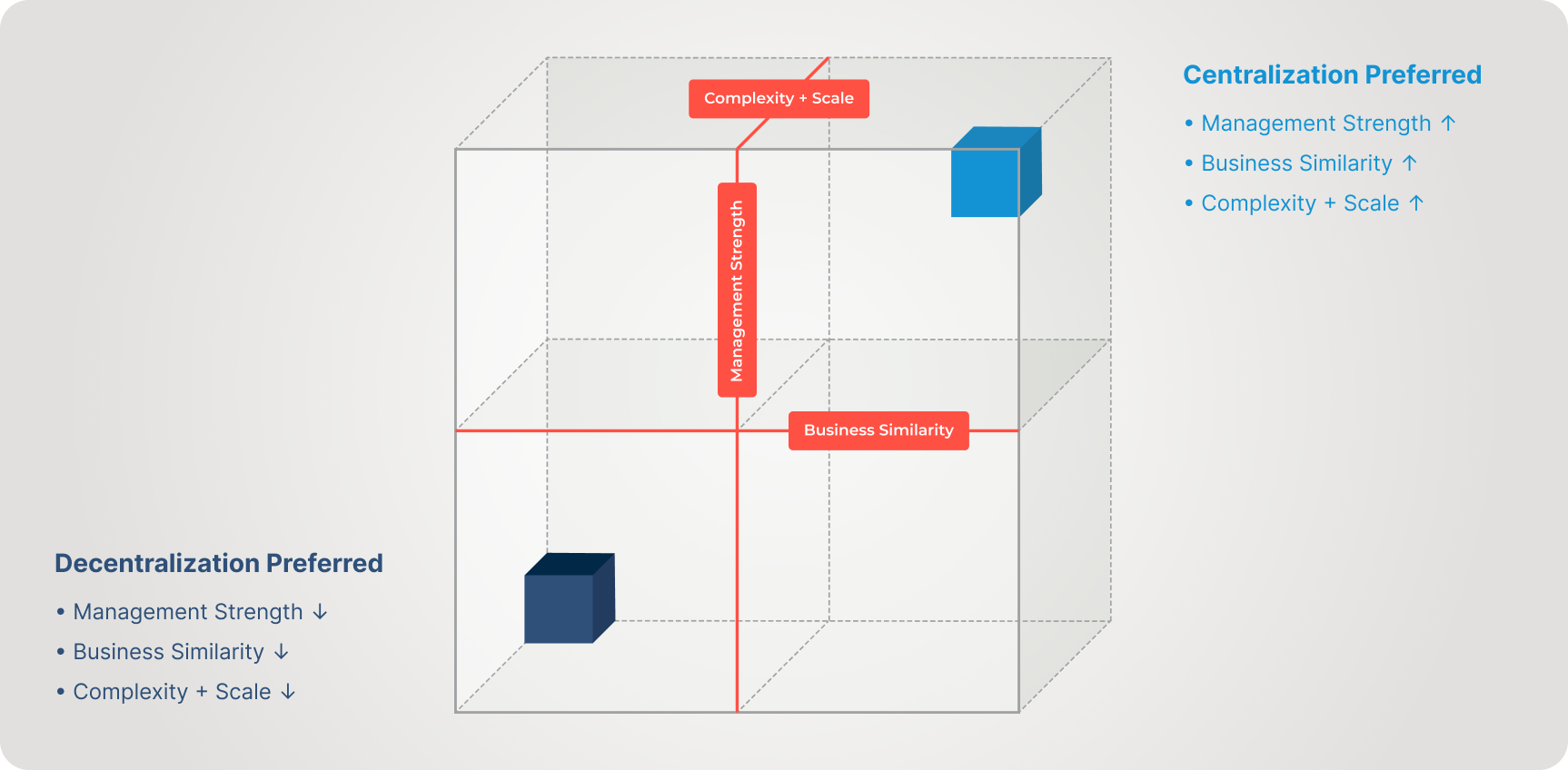
John Paterson
Founder & CEO, Quadshift
What's it like being a Quadshift Company?
Everyone:
"How does Quadshift manage software companies in so many different vertical markets and industries?"
Quadshift:
"We don't."
Everyone:

To centralize or decentralize, that is the question.
And it’s not just a theoretical one. This decision plays a critical role in the long-term success of any complex, multi-business organization—including how we manage the companies in the Quadshift family.
While the opening line is intentionally cheeky, the truth is that we do get involved—but in very specific ways. Our involvement is often agency-like, providing support services and strategic input rather than top-down control. We believe it doesn’t make sense to centrally manage each company, especially when those companies operate in vastly different vertical markets.
Others in our industry have come to similar conclusions, with some exceptions.
As a general rule, the value of centralization depends on two things: how similar the businesses are, and how strong the local management teams are. The more alike the companies, the more likely it is that central systems or resources can drive value. But even then, execution depends heavily on the competence of the people in charge.
Within similar businesses or divisions, it's easier to spot where there are redundancies and strengths, and where improvements can be implemented across different businesses or divisions by management, successfully. However, even where businesses are similar, management's ability to execute successfully and avoid doing more damage than good relies on its competence. Even when leadership is put in charge of a new division on paper, if they are incompetent, they will not be able to get anything done.
A third critical dimension is complexity and scale. The larger and more complex the organization, the more important decentralization becomes. Even the best leaders have a limit to how many direct reports or moving parts they can effectively manage. Until AI produces superhuman managers, we all operate within human constraints.

Constellation Software has become an interesting case study in this regard.
"Delegation to the point of abdication"
Constellation Software is a Canadian software conglomerate that acquires and holds vertical market software companies (a much larger version of Quadshift that has been doing it for decades). They are a perpetual owner, just like us, and own 600+ VMS companies. Constellation’s enterprise value today is around $57 billion as of April 2023 and the company has reliably compounded at 30+% a year, making it one of North America's great technology stocks of the past 20 years.

In the shareholders’ letter of 2015, Mark Leonard, the infamous yet immensely private founder of Constellation, wrote:
Head office provides the Operating Groups with capital allocation assistance and decisions, and tries to disseminate some best practices, a few clear rules, a bit of coaching, and coughs up the occasional partly trained employee for the Operating Groups. Compliance, investor relations, and handling the finance function round out the head office duties. Whenever we feel stretched at head office, we download more of our work to the Operating Groups. This delegation to the point of abdication philosophy (first discussed in the 2010 Letter to Shareholders) seems to have worked so far.
Constellation's operating philosophy of delegation to the point of abdication has served it well. We've adopted a similar philosophy, albeit with some minor tweaks that we feel suit our companies, and perhaps our size, at this stage of our company's life.
Quadshift, like Constellation, has spotted patterns in the challenge that vertical market software companies face, so Quadshift provides services to the operating companies in an agency-like manner rather than top-down dictation. We can also provide advice, take on ad-hoc projects and jump in as needed to help, usually at the request of the managers. We are careful, however, to centralize control of the business.
This approach is most similar to another legendary high performer in our business: Robert Smith's Vista Private Equity.
There is perhaps no better software investor in the world than Vista.
"Software companies taste like chicken. They're selling different products, but 80% of what they do is the same."

Robert Smith's Vista Private Equity has generated annual returns averaging 30%+ since the fund's inception in 2000. Unknown to many, Vista's combined 80+ portfolio company makes it the world’s fourth-largest enterprise software company after Microsoft, Oracle, and SAP.
Vista's outstanding returns have been generated not only from selecting great software businesses, but from implementing Vista's best practices. These best practices have been cultivated over two decades of pattern recognition from investing exclusively in enterprise software companies. According to Robert Smith, "Software companies taste like chicken. They're selling different products, but 80% of what they do is the same."
Unlike Constellation, Vista does get deeply involved—often through its 100+ person in-house consulting team, Vista Consulting Group. They implement a closely guarded 110-point playbook across their companies to optimize performance. Their returns speak for themselves.
What we can learn
Constellation and Vista may differ in how hands-on they are, but neither centrally manages every aspect of their portfolio. Instead, they tailor their involvement based on patterns they’ve observed across similar companies.
At Quadshift, we aim to strike a balance—supporting our companies where it makes sense, and staying out of the way where it doesn’t. We provide resources, guidance, and execution support in key areas, but always with humility and respect for the operators running the businesses day-to-day.
So, what’s it like being a Quadshift company?
It means you’re not micromanaged—but you’re never on your own. You run your business with the autonomy and pride of an owner, but with access to a team that’s seen the patterns and solved the problems across dozens of other vertical software companies.
We don’t dictate. We support. And when you need help—from marketing to hiring to AI—we show up with sleeves rolled.
Our role is to amplify what’s already working, fill in the gaps where needed, and get out of the way where things are thriving.
We’ve learned from giants like Constellation and Vista, but we’ve adapted their lessons to fit our size, our culture, and the people we work with. If you join Quadshift, you don’t just get a new parent company. You get a quiet but powerful partner.
That’s what it’s like to be a Quadshift company.
More specifically, I’ve detailed exactly how Quadshift gets involved with our companies in this article.




